1 - 15 of 87 records
Age of tin
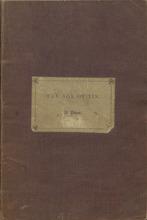
Description: "London: Blatch and Lampert, Printers, Grove Place, Brompton."--Colophon.,Information about this digital copy: digitized by University of Missouri--Columbia, MU Libraries on May 31, 2016. Scanning specifications: 600 dpi; scanned on Zeutschel OS 15000; cropped using Photoshop.
Member of: All Books and Texts
Resource Type: Text
Annales : The true and royal history of the famous empresse Elizabeth : [pages 365-366]
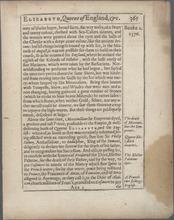
Description: Information about this leaf: From Annales of Elizabeth (1625) containing pages 365-366 from Book 2 dated 1576. Typography is Roman with selected phrases such as "Queen Elizabeth" and the formal names of figures and countries in italics. Noteworthy on page 365 is the mention of the death of the Holy Roman Emperor Maximilian II and the succession of his son, Rudolf II. Page 366 tells of the death of Walter Devereux, the 1st Earl of Essex.,This leaf was identified from information on the label.
Member of: Pages from the past - all pages
Resource Type: Text
Attempt to explain, define, and appretiate the liberty of the press, with a view to its importance, as connected with the rights and welfare of the people
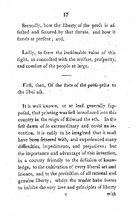
Description: "Dedicated by permission to the Right Hon. Thomas Lord Erskine.",Advertisement at end.
Member of: All Books and Texts
Resource Type: Text
JM-186: Three scenes about labor workers
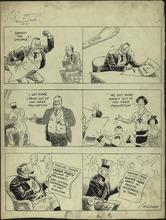
Description: This cartoon depicts three different scenes in separate panels. In the top panel, a business man is angry about workers' unions and wants them to be "smashed," but later, with the threat of a strike hovering over him, he signs his name on a wage increase form. Negotiation between workers and employers were becoming a more common occurrence in the 1910s. Unions and the notion of collective bargaining were beginning to be protected under the law. In the middle panel, a man's boss is happy to get more labor out of the man since prohibition. The man's family also claims to get more money out of him since prohibition, and the children show off their new shoes. This panel shows the desired result of prohibition, which was to eliminate the loss of prosperity and productivity associated with drunkenness.In the bottom panel, John Bull smiles while reading the English paper, which proclaims the growing labor party might control government at next election. Meanwhile, Uncle Sam reads an American paper, which proclaims the Farmer Labor Party has grown to contain three people. As Uncle Sam reads the paper, there is panic in the background. The Farmer Labor Party was a political party founded in 1920 from the larger, international workers' movement associated with communism. As Uncle Sam reads the paper, there is obvious panic in the background. This last panel shows the significant difference in culture between the United States and England. England, like many other European states, was learning to tolerate the labor parties, and it eventually adopted the new parties into their political landscape. The United States was hypersensitive to any hint of communism, due to fears of a workers' revolution. Unlike England, the United States constantly sought to limit the influence and growth of these labor parties as much as possible. This fear is seen by the Red Scare the United States experienced in the 1920s. The Red Scare spread mass fear of communism, and it sought to eliminate communism completely from American economics and culture. (Summary created by Mary Delano, MU History Intern, Spring 2018)
Member of: McCutcheon Editorial Cartoons - ALL (Collection)
Resource Type: Still Image
JM-171: Bi-plane dogfight
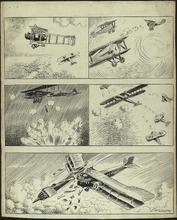
Description: Editorial cartoon depicting five panels of bi-plane dogfight scenes in World War 1. The planes with the iron cross symbol are German planes, while the planes with the roundels are either German or French.
Member of: McCutcheon Editorial Cartoons - ALL (Collection)
Resource Type: Still Image
JM-165: The great temperance worker
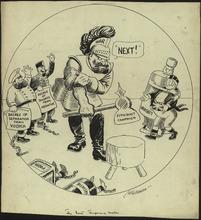
Description: This cartoon shows personified World War I separating countries from their chains to alcohol. The man with the decree on separation is a representation of Russia, who legalized prohibition from 1914 until 1925. The man to his right, holding a separation for absinthe, is a personified France, which banned the manufacture and sale of absinthe in 1914. The man chained to whiskey seeking freedom is representative of Great Britain, who never ratified any serious form of a national alcohol ban. There are many theories as to why these countries (including the United States from 1920-1933) banned the sale or manufacture of alcohol in some way. The cartoon suggests these bans were caused by what many referred to as the "efficiency campaign," which was depicted as the axe used to separate alcohol from these countries. The efficiency campaign suggested these countries were more productive when its citizens (especially laborers) were sober. After banning the sale of alcohol in Russia, the government proudly announced Russia's increased labor output and better economic standing. The heightened need for resources, and diminished labor force from World War I is thought to have inspired the need for higher economic efficiency in European nations. (Summary created by Mary Delano, MU History Intern, Spring 2018)
Member of: McCutcheon Editorial Cartoons - ALL (Collection)
Resource Type: Still Image
JM-164: Will there be enough to go round?
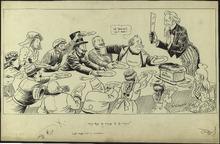
Description: This cartoon depicts Uncle Sam trying to divide "U.S. Bread" among various nations. In 1915, World War I was being fought in Europe, but the United States was maintaining a neutral position. Despite its neutrality, the United States supplied resources and arms to nations during the war. All of the countries sitting at the table are nations who lobbied for resources from the United States during the war. England is attempting to block Germany's chance of receiving resources from Uncle Sam. This is representative the attempts of the British government to limit the United States aid to Allied Powers, most often England. The United States is also sitting at the table, looking worried about sharing the beard with other nations. The United States distributing more resources than it could afford was a fear for many Americans in the 1910s. (Summary created by Mary Delano, MU History Intern, Spring 2018)
Member of: McCutcheon Editorial Cartoons - ALL (Collection)
Resource Type: Still Image
JM-202: Cartoons of the day
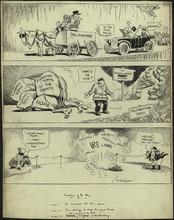
Description: Editorial cartoon depicting three separate cartoons. In the top panel, a man on a cart titled "Delaware" blocks women in cars titled "Suffrage" from passing him on the road to the 1920 polls. In the middle panel, "Germany" kills his pack horse ("Hope") underneath a burden of "Economic Terms of the Treaty"; he is unable to continue on "Reparation Trail". In the bottom panel, Uncle Sam and John Bull attempt to communicate via telephone, but uproar in Ireland blocks connection.
Member of: McCutcheon Editorial Cartoons - ALL (Collection)
Resource Type: Still Image
JM-C010: The changing world: Books that caused fear now and then
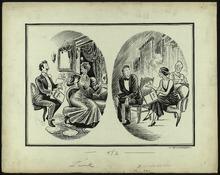
Description: Editorial cartoon consisting of two scenes. In the first scene, a Victorian woman is recoils from a "Ouida" book presented to her by a man. In the second scene, a woman in 1920s attire shows a sweating man a book titled "Sex Problem". "Ouida" was the pseudonym of the English novelist Maria Louise Ramé, who was known for her literary salon and the scandalous books she published toward the beginning of her career.
Member of: McCutcheon Editorial Cartoons - ALL (Collection)
Resource Type: Still Image
JM-274: Guiding hands
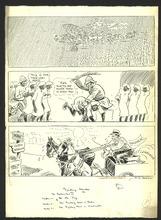
Description: Radio guides plane; British officer beats Indian; Hoover calls extra session.
Member of: McCutcheon Editorial Cartoons - ALL (Collection)
Resource Type: Still Image
JM-207: Will they come to an agreement?
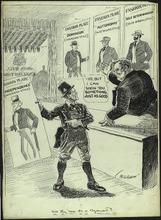
Description: Editorial cartoon depicting Irish figure asking for American style independence. John Bull offers "Canadian style" Dominion, "Australian style" Autonomy, and "South African style" Self-Determination instead.
Member of: McCutcheon Editorial Cartoons - ALL (Collection)
Resource Type: Still Image
JM-026: At 70% naval efficiency in the United States
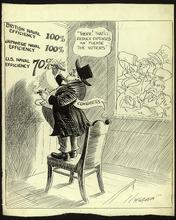
Description: Editorial cartoon depicting a man representing Congress in front of a blackboard showing the naval efficiency of Britain, Japan, and the United States. Britain and Japan both have 100% efficiency, but the man crosses out the 100% mark by the United States and replaces it with 70%, remarking on how this will please voters and reduce costs. Uncle Sam and Hughes watch from the window and express shock.
Member of: McCutcheon Editorial Cartoons - ALL (Collection)
Resource Type: Still Image
JM-W017: "I'll have to tighten your belt, Uncle"
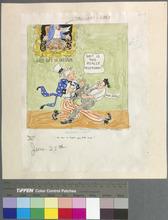
Description: A figure labeled "New Deal" severely tightens Uncle Sam's belt, while Uncle Sam protests. A portrait of the "New Deal" on the wall behind the two figures has the label: "God's Gift to Britain."
Member of: McCutcheon Editorial Cartoons - ALL (Collection)
Resource Type: Still Image
JM-W024: In the Allied camp
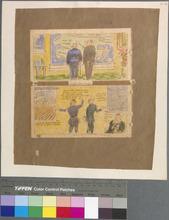
Description: Editorial cartoon depicting Churchill and FDR looking at a map of Europe in the top panel. In the bottom panel, Hitler, Togo, and Mussolini worry about the plane production in the U.S. as the "unpredictable" factor compared to their U-boats.
Member of: McCutcheon Editorial Cartoons - ALL (Collection)
Resource Type: Still Image
JM-W012: Trying to sign her up for international unity, financed by Congress
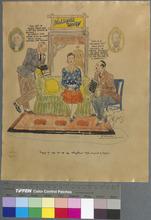
Description: Editorial cartoon depicting two men trying to sell books with titles about International Unity with Britain and a better League of Nations to a woman dressed in the colors of the American Flag. The men also claim to have already asked Congress for a billion dollars as a starter fund.
Member of: McCutcheon Editorial Cartoons - ALL (Collection)
Resource Type: Still Image
Pagination
- Page 1
- Next page